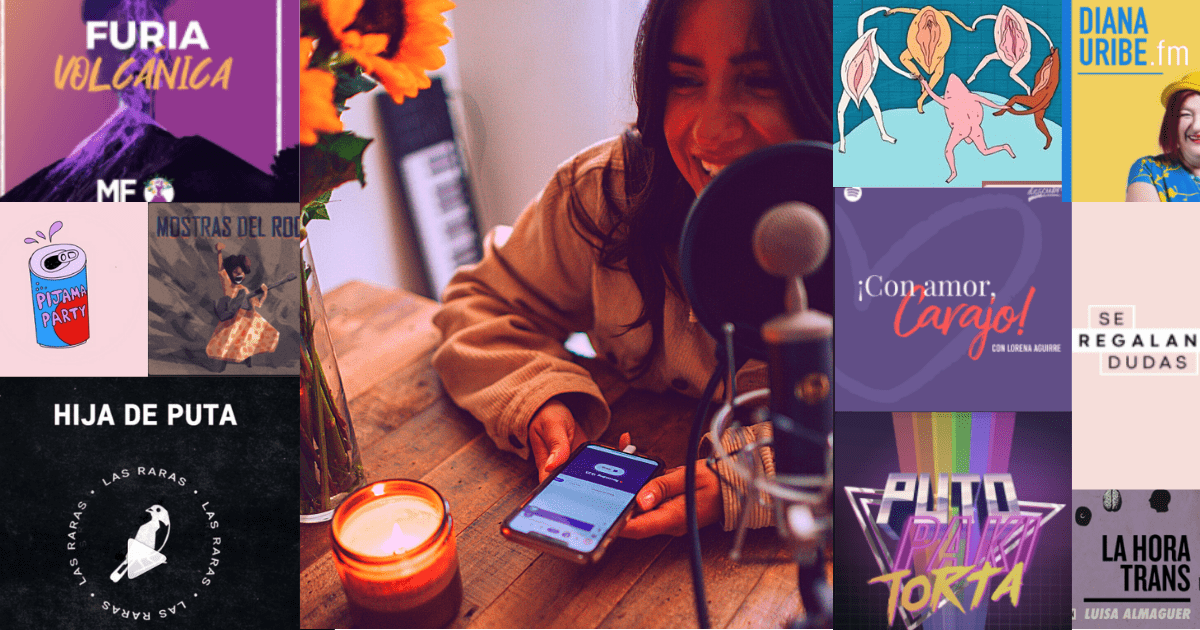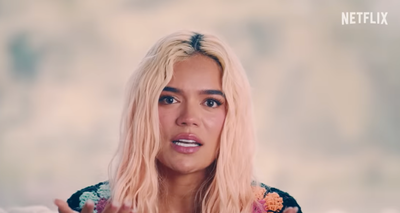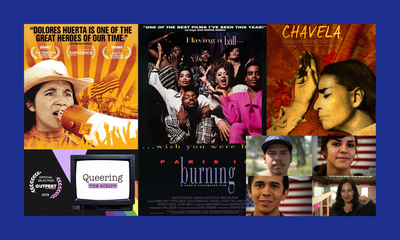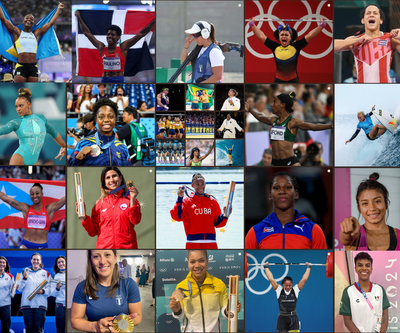One of the few good things the Covid-19 pandemic left us is podcasts. Lots of podcasts. Of all sizes and colors, and about everything. Who isn’t making a Latinx podcast these days? I recently launched two! Exactly because of this, one of the current problems with podcasts is that it’s hard to separate the wheat from the chaff.
But don’t worry, we’re here to help. Whether you’re looking for the Latina angle, you want to refresh your Spanish or to catch up with the latest advances of feminism in Latin America, then you will find what you’re looking for on this list of Latinx Feminist Podcasts!
Don’t speak Spanish? Not an issue: you can listen to these 9 Latinx/WOC-ran podcasts from the US, in English.
1. Concha Podcast (Argentina)
In Spanish, ‘concha’ is sometimes a tortoise shell, sometimes a seashell, sometimes a name. In Argentina, ‘concha’ means pussy or cunt, and it’s also the name of a ridiculously popular podcast with millions of streams and —before quarantine— even live-audience shows. Conducted by Laura Passalacqua, Jimena Outeiro and Dalia Walker, this show is all about life around the concha. Join these three friends to casually discuss the cis-woman’s life. No taboos, no script.
En Concha Podcast, las tres amigas Laura, Jimena y Dalia descubren y debaten sus vidas, las experiencias de sus oyentes y su recorrido por el feminismo como mujeres cis. Con menos de dos años de trayectoria, este podcast ya ha llegado a una audiencia millonaria.
2. Diana Uribe (Colombia)
An acknowledged historian and education influencer, Diana Uribe worked for more than 20 years on the radio before moving on to podcasting. With her casual tone and her uncomplicated —but comprehensive— understanding of historical phenomena, Diana will get you immediately hooked with whatever historical process she’s talking about. In other words, if she were your History teacher, you’d wish you were back in school.
Los podcasts tienen esa cualidad de combinar entretenimiento con educación. Si te interesa la historia, no dudes en escuchar a Diana Uribe. No solo su conocimiento es profundo y abarcativo, sino que tiene una forma de narrar que es entretenida incluso para aquellos que odiaban las horas de Historia en la escuela.
3. Furia Volcánica (Central America)
Did you say feminism and migration? Furia Volcánica is a brand new show produced by Volcanicas, a feminist collective from Central America of migrant, exiled and refugeed women based in Costa Rica; and Managua Furiosa, a digital platform that promotes online and offline spaces for young people from the region. With only a few episodes out; so far, so good!
Si eres una latina en los Estados Unidos, entonces la migración debe ser un tema importante para ti. Este nuevo podcast producido en América Central, Furia Volcánica, es lo que debes oír si te interesa conocer la situación actual de las mujeres migrantes, refugiadas y exiliadas en América Latina.
4. La Hora Trans (México)
Feminism is not complete without trans-feminism. If you’re trans or interested in Latinx trans issues, then La Hora Trans is a must-hear for you. Life stories, transition stories, problematics and experiences within the trans universe, from Mexico City. Conducted by Luisa Almaguer.
Lo dijimos en inglés y lo repetimos en español: ¡el feminismo no está completo sin transfeminismo! Por eso, si eres trans o si te interesa conocer más sobre la situación de personas trans en América Latina, entonces el podcast mexicano La Hora Trans es para ti.
5. PutoPakiTorta (Argentina)
If you miss getting together with your friends and cracking up a beer, then you might as well crack one up for yourself and press ‘play’ on PutoPakiTorta. Originally a radio show, this podcast is counducted by Marcos, a gay man, Vicky AKA ‘Sarita’, a straight woman; and Bárbara, a lesbian —respectively, a puto, a paki and a torta, in local Buenos Aires slang. These three friends discuss LGTBQ+ issues, sexuality, and their conflicted personal lives. When they manage to prepare a script beforehand, they find it hard to follow.
Mucho más que un podcast sobre asuntos LGTBQ+, PutoPakiTorta es un podcast (ahora también videocast, en YouTube) de humor, experiencias cotidianas, buena música, increíbles entrevistados y la dramática amistad entre Marcos, ‘Sarita’ y Bárbara.
6. Con Amor, Carajo (México)
For a long time, women —Latinas specially!— have been socially conditioned to put romantic love in the center of their lives. And yes, maybe we can’t stop thinking about love, but we can definitely start changing the way we feel about it. Conducted by Lorena Aguirre, ¡Con amor, carajo! is self-defined as the ‘self-help podcast for women who hate self-help.’ With more than 5 years on the run and over 200 episodes, it has become one of the favourite podcasts in Latin America. Emotions, feminism, spirituality and sororidad (female comunion) —with love, from Mexico.
Con Amor, Carajo es el podcast de ‘autoayuda para quien odia la autoayuda’. O sea, es para aquellas mujeres que no quieren trucos baratos a la hora de repensar su relación con el amor, sino una verdadera reeducación emocional, con los pies bien firmes sobre el contexto social que nos rodea.
7. Las Raras (Chile)
There is probably no other way to describe Las Raras than as ‘audible longform’. This compelling nonfiction podcast addresses politics, feminism and Latin American issues through excellent journalistic work and the finest sound edition. Las Raras has the merit of being the only Spanish podcast to be selected as part of the first version of the Google Podcasts creator program. They have received production support from Google, PRX, International Women’s Media Foundation and, more recently, they work with the Brooklyn-based podcast studio Adonde Media. Produced and conducted by journalist Catalina May and co-directed with sound-engineer Martín Cruz.
Lo que se conoce como periodismo narrativo (longform, en inglés) toma forma de audio en Las Raras, un podcast con piezas cuidadas, bien investigadas, con entrevistas profundas y atrapantes, realizadas por la chilena Catalina May. Este podcast destaca también por su excelente trabajo en dirección y edición de sonido, realizado por Martín Cruz.
8. Se regalan dudas (México)
Questions, questions and more questions. Exclusively on Spotify, Lety Sahagún y Ashley Frangie critically doubt and debate around different topics with experts and friends.
En Se Regalan Dudas hay más preguntas que respuestas, ¡pero esa es la gracia! Si te interesa la reflexión crítica a partir de la duda, ¡no dudes! Escúchalo.
9. Furia Bebé (Argentina)
But feminism is not all about serious issues! To end this list, we want to recommend a few podcasts that fall on the light side of feminismo. Furia Bebé is a humor and culture show hosted by Argentinian feminist superstars Malena Pichot and Señorita Bimbo.
El feminismo puede ser serio, pero no por eso aburrido. Las superestrellas feministas Malena Pichot y Señorita Bimbo, desde Argentina, se encargan de demostrarlo.
Help Power Up Our Work. Sign up for our ‘BoldLatina News’ or Become A ‘BoldLatina Collective’ Member Invest In Our Latina Newsroom + Future
10. Pijama Party (Argentina/New York)
We know how often ‘podcast’ becomes a synonym for ‘some guys casually talking about Hollywood films.’ Luckily, if you scratch under the surface, there is much more than that: there are girls casually talking about Hollywood films! Conducted by two Argentinian women based in New York, illustrator Pepita Sandwich and writer Malén Denis, Pijama Party is an over-30 gaze on those popular films from the 80’s, 90’s, and early 00’s we used to watch at sleepovers. How did these movies built up our characters and what did they mean to us as millennial Latinas in the making? With an engaging mix of nostalgia, cinephilia and a critical feminst point of view, Pepita and Malén analyse how our current ideas —particularly about love and romance— were shaped by American films.
Listen to “S.03 #09 -“The NeverEnding Story”/ “La Historia sin Fin”” on Spreaker.
Malén Denis y Pepita Sandwich son una periodista y una ilustradora, ambas latinas radicadas en Nueva York. Desde ahí, analizan las películas de Hollywood que marcaron nuestra infancia y, por qué no, nuestras ideas sobre el amor romántico.






